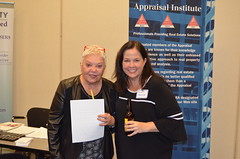Category Archives: ICAP In The News
VIDEO: Why are you an ICAP Member ?
Five members of ICAP’s Board of Directors share why they are members of ICAP. The five individuals featured in the video are: Barton DeLacy, MAI, ASA, AI-GRS, ASA, John Satter, MAI, Ken Mrozek, MAI, SRA, ASA, Barbara Neal, and Ivette Collins, MAI.
ICAP works to promote the appraisal profession and its image to the general public and to users of appraisal services. ICAP initiates discussion and analysis of issues affecting professional appraisers and monitors political action with the intent to influence legislation, regulation and public opinion toward the appraisal profession.
Join ICAP at http://www.ICAPweb.org
President’s Message: A Theme for ICAP in 2017 and Beyond
President’s Message: A Theme for ICAP in 2017 and Beyond
Appraisal Professionals – what does that really mean?
Professional, per Webster’s Dictionary is defined as one “possessing great skill in a specialized field, one with assured competence.”
Profession is further defined as “an occupation or vocation, a calling, requiring training in the liberal arts or the sciences and advanced study in a specialized field.”
Historically, “professions” were limited to the practices of medicine, law or religious clergy. Today we also attribute “professional” to the fields of personal and financial services; so add accounting, if not “wealth management.” In the building trades we have architects and engineers. And while so many of these fields are focused on client assistance, arguably valuers are above all -as neutrals in service to the public alone. Only clergy have a higher claim, in their dedication to the Almighty.
Professionals are generally esteemed for their expertise, but also for their evident success – too often measured merely in monetary terms.
But what truly sustains professional services are long term client relationships. Think about what the professionals in our own lives and businesses may provide us: they counsel, they teach, they may save us money, sometimes they make us money, sometimes they fix problems, sometimes they even cure. On rare occasion they perform seeming miracles. They earn our respect and esteem.
Now, let’s look at the typical appraisal “business.” Ask yourself, do we really develop the kinds of clients who would respect us as professionals?
Who would most appraisers list as their clients? Banks, lending agencies and government regulated institutions? Too often our work product, “the appraisal” is viewed by such clients as a mere commodity. Quality and insight have been so homogenized all that differentiates one provider from another is cost and turn-time. Then, this work product, truly an expert opinion of value, is subject to heavy regulation with severe penalties for non-compliance.
Let’s look at our sister professionals in the law and accounting fields. Yes, the drafting of some contracts, the filing of some taxes are surely commodity services that underpin many businesses. Yet, most lawyers and accountants grow in their profession by leveraging their specialized knowledge and skills to also provide counsel. Professionals help their clients solve problems. They aspire to become trusted advisors. So should appraisers.
Perhaps ICAP can help our members in a small way by giving them a voice with our regulators and tools with our seminars. If ICAP has a theme this year, it is to help our members grow their business and become better respected by our clients. Respect within the firms where we work, be it brokerages, banks or government agencies. For those in the fee business, perhaps we can help you grow your client base beyond lenders and develop the kinds of sustaining relationships that truly value your good counsel.
Barton DeLacy, MUP
ASA, MAI, AI-GRS, CRE, FRICS
President, Illinois Coalition of Appraisal Professionals (ICAP)
ICAP Attended The 2016 AARO Spring Conference
On behalf of ICAP, Ken Mrozek, MAI, SRA attended the Appraiser Qualifications Board (AQB) Public Meeting and Association of Regulatory Officials (AARO) 2016 Spring Conference. This year’s spring conference was held April 8-10 at the Hyatt Regency Downtown in Phoenix, Arizona. It was attended by representatives from the TAF, ASC, AQB, APB, ASB, ,OCC, several AMCs, AI, ASFMRA, NAIFA, State Coalitions (including Illinois, Ohio, Arizona) as well as many state regulator departments.

Topics of discussion at the conference included:
- Updates from TAF, ASC, AQB, APB and ASB
- Definitions and Differences Between Appraisals and Evaluations
- Background Checks – Update
- Safety Tips for Those Dealing with Complaints
- ASC Oversight and AMC Final Rules
- Customary and Reasonable Fee Survey
- AMC Appraiser Panel – The Inside Story of Appraiser Selection and More
- Alternative Valuation Standards
- AMC Legislation Discussion
Additionally, time was allocated to various Break Out Sessions, meetings included: AMCs & Professional Organizations, Board Members, Investigators, Administrators and Attorneys, and Industry Representatives. The following is a summary of the discussions as presented by the various presenters and discussion panels.
Appraiser Qualifications Board (AQB) Public Meeting

Joseph C. Traynor, Chair of Appraisal Qualifications Board (AQB), AQB Public Meeting
The AQB held a public meeting prior to the start of the AARO Conference from 9:00 am to 12:00 pm (agenda). Reports were given from the various The Appraisal Foundation (TAF) boards, including TAF, ASB, APB, and ASC. The reports were shorter versions of the reports and discussions given during the AARO Conferences. And so, most information covered in this meeting is addressed later in this report. Information covered in the AQB Public Meeting which was not covered in AARO Conference Notes, includes:
- Agenda (click here)
- National Exam Statistics (Pass Rates)
- AQB stated exam pas rates have remained stable since 2008 and are satisfied with the pass rates
- Discussion on Shortage of Appraisers centered on article (click here) by David Bunton in Appraisal Buzz
- There was a period of time allowed for public comment.
Association of Appraiser Regulatory Officials (AARO) Conference
Suzy Gardner, Certified Fraud Examiner, FDIC spoke on Appraisals and Evaluations
- Presentation (click here)Appraisals – FDIC Expectations
- Written
- USPA Compliant
- Contains sufficient information
- Analyze Deductions and Discounts for Construction Projects
- Contains an estimate of market value
- Evaluations – FDIC Expectations
- Does not need to be USPAP Compliant
- Must provide a credible value conclusion
- Individual preparing evaluation must be competent
- Possess RE training/experience
- Independent of transaction
- Provide support for determination of market value
- An Evaluation per Agencies’ Guidelines provides an estimate of market value
- FDIC does not prevent an Real Estate Appraiser from completing an Evaluation
- An appraiser completing an Evaluation
- It is an appraisal
- It must comply with USPAP
- An appraiser completing an Evaluation
- FDIC only requires an appraisal for a small percentage of transactions (Federally Regulated Transactions – FRT)
- Reported that in 1994 only 4% of all Real Estate Transaction required the services of a RE Appraiser (over $250,000).
- Today only 12% of all Real Estate Transaction require the services of a RE Appraiser (over $250,000)
- If the threshold is raised to $400,000, then only 6% would require a RE Appraiser
- If the threshold is raised to $500,000, then only 4% would require a RE Appraiser
- Noted the amount of transactions which have appraisals complete is significantly higher than what is required
David Bunton, President of The Appraisal Foundation (TAF) gave an overview on TAF Activities
- Presentation (click here)
- Appraiser Regulator Town Halls
- On-line Courses for State Regulators
- 4-Hour Online USPAP Course for state regulators is now available
- Investigator Training (Levels I, II, & III): St. Louis, MO
- Legislative Activity on Standards
- 25th Anniversary, Appraiser Regulatory System
Jim Park, Executive Director of the Appraisal Subcommittee (ASC)
- Presentation (click here)
- ASC Oversight of State Appraisal & AMC Programs
- Certification and Licensing of Appraisers
- Registration and Supervision of AMC’s
- 55 States & Territories Rated (10 Excellent, 31 Good, and 14 Needs Improvement)
- ASC Monitoring & Review of Appraisal Foundation
- What is an FRT? – Title XI FIRREA defines
- ASC Maintains National Registries (Appraiser/AMC)
- 97,500 credentials
- 39,400 Certified General
- 50,000 Certified Residential
- 8,300 Licensed
- Trainees
- 9,000 to 10,000 (not tracked by ASC, estimated)
- 97,500 credentials
- Unique Identification Number (for each appraiser)
- Developed application and interface
- Currently in State Testing
- Roughly 6 – 12 months voluntary adoption period
- Initiate rulemaking if needed in 2017
- Number would only be used between state and ASC
Rick Baumgardener, Chair of Appraisal Practices Board (APB)
- 6 Valuation Advisories Adopted
- 5 Valuation Advisories Under Development
- Collection and Verification of Residential Sales Data Used in the Sales Comparison Approach
- Collection and Verification of Data Used in the Sales Comparison Approach for Non-Residential Properties
- Valuation of Green & High Performance Property – 1 to 4 Unit Residential
- Valuation of Green& High Performance Property – Commercial, Multifamily and Institutional
- Valuation for Financial Reporting (VFR)
- Investigating Potential Future Advisories
- Discounted Cash Flow Analysis (DCF)
- Retrospective Value Opinions
- Prospective Value Opinions
Joe Traynor, Chair of Appraiser Qualifications Board (AQB)
- Discussion Draft – Potential Areas of change in the Real Property Appraiser Qualification Criteria Areas of discussion include:
- Alternative Track for Licensed Residential to Certified Residential
- Enhanced Practicum Curriculum
- Documenting Alternative Experience
- “Trainee” Nomenclature
- Three-Year Supervisory Residency Requirement
- USPAP Q&A Updates
- 1st Exposure Draft for 2018/2019 USPAP Expected to be out in April
- Proposal to “Draft” Report concerns
- Looking for feedback
- Won’t be tied to completion of assignment
- Will be tied to signed certification
- Drafts must be clearly and conspicuously identified
- If trying to send work results in draft, could be an ethics violation
- Record keeping – record of all reports must be in work file
- Proposal to “Draft” Report concerns
- Clarifying Term “Assignment”
- Valuation service the appraiser provides
- Turnaround time is a contractual agreement, not a USPAP violation
- Assignment guidelines like Fannie Mae Guidelines violations are USPAP violations
- Assignment conditions that apply to scope of work are subject to USPAP compliance
- 1st Exposure Draft for 2018/2019 USPAP Expected to be out in April
Background Checks Panel
- Debra Rudd, Division Manager, Real Estate Appraisal Division
- Arizona started Background Checks in 2007
- Trouble understanding criminal terminology & equivalencies of “Rap Sheet”
- Board wasn’t able to look at Rap Sheet, but had to approve or deny
- Training of staff & board members difficult
- Regular turnover
- Confidentiality was troublesome
- 1-2 people could open envelope
- Kept in separate locked cabinet
- Tried “clearance card”
- FBI database not always updated
- Some appraisers already approved of offense, but flagged on Rap Sheet
- Arizona started Background Checks in 2007
- Kristen Worman, General Counsel, Texas Appraiser Licensing & Certification Board (TALCB)
- TALCB Slide Set (click here)
- Criminal History Checks in Texes (since 2007)
- TALCB Working Group – Appointed in 2015
- Recommendations & Lessons Learned
- Fingerprint Background Checks on all existing and applicants
- Fingerprints required only on the first background check
- Tim Doyle, Senior VP, Conference of State Bank Supervisors discussed the NMLS System, slide set (click here). It is available to State Regulators as a method to track their Appraiser licensees. It tracks pertinent data, including licenses, education, and discipline. It is also compliant with 2017 background check requirement. Their systems are an approved channel for the FBI national database, required for proper background checks. Submitted background checks are received back in 2 to 12 hours.
Review of AMC Rule, Jim Park, Executive Director of ASC & Alice Ritter, ASC General Counsel
- What is an AMC?
- Within a given year, oversees a network or panel of
- More than 15 certified or licensed appraisers in a state, or
- 25 or more nationally
- Recruit, select, and retain appraisers;
- Contract with licensed or certified appraisers to perform appraisals;
- Manage the process of having an appraisal performed, including providing administrative duties; or
- Review and verify the work of appraisers.
- Within a given year, oversees a network or panel of
- Participating State Authority
- Register and renew AMC registrations
- Examine AMCs and require AMCs to submit relevant information to State
- Verify appraisers on AMC appraiser panels hold valid State certifications or licenses
- Conduct investigations of AMCs to assess for potential violations
- Discipline AMCs
- Report violations to ASC
- AMC Ownership Limitations
- AMC Registration Fee to be Collected by States for ASC
- $25 multiplied by the number of appraisers working for or contracting with that AMC in such State during the previous year
- AMC’s not in existence for a years, $25 multiplied by the number of appraisers working for or contracting with that AMC in such State since the AMC commenced doing business
- AMC Final Rules 1st Draft should be out for 60-day comment period in April
Customary & Reasonable Fee Survey
- Larry Disney, Executive Director of Kentucky Real Estate Appraisers Board
- Kentucky conducted 1st survey in 2013, getting ready to update in 2016
- SE Louisiana University completed survey
- Considered by Report Type (1004, 1004 FHC, 1004C, 1025, 1073, & 2055)
- Bruce Unangst, Executive Director of the Louisiana Real Estate Appraisers Board
- Louisiana uses C&R Study as a tool to avoid problems
- Kept the study simple, made it available to all stakeholders, updated annually
- Louisiana did have an adjudication hearing for one AMC
- Unanimous vote (including AMC Rep on the board) against AMC
- $10,000 fine + around $13,000 costs of adjudication hearing
- Currently up for appeal
- Herb Holloway, Research Economist at Southeastern Louisiana University Business Research Center
- 5 States have conducted studies (TX/LA/KY/VA/GA)
- SE University fees for survey have run between $8,000 and $15,000
- Survey all online and by email
- Note: there has been no evidence to date for any correlation between years of experience and fees
- Can be difficult interpreting C&R Fee Study
Alternative Valuation Standards
- Scott Robinson, 2016 President of the Appraisal Institute
- Presentation (click here)
- Standards of Valuation Practice & Valuer’s Code of Professional Ethics
- Adopted in 2014
- Proposing as an “Additional” set of Standards for AI Members and Valuation Professionals
- May be used where national/international standards are not required
- Standards are:
- An Additional set of standards
- Principles-based
- Focus on the core principle rather than on compliance with rules
- Standards are not:
- Not intended to supplant USPAP or other national standards
- Not an alternative to USPA or IVS or other relevant standards
- Not rules-based
- Not dictate methodology

- David Bunton, President of The Appraisal Foundation
- Presentation (click here)
- Recognizing standards other than USPAP for non-federally regulated transactions would seriously erode public trust
- Legislative Initiatives for Alternative Standards to USPAP – Texas, California, Montana, Tennessee, Florida, Virginia
- Alternative Standards to USPAP Divisive, Expensive, and Opposed
- Significant Impact
ICAP Participates NSAO Meeting, Washington, D.C.
October 16, 2015:
by Karen Emerle, SRA
ICAP is one of 21 State appraiser coalitions currently participating in the Network of State Appraiser Organizations (NSAO). On October 16, 2015, NSAO held a Work Group meeting at the National Association of Realtors (NAR) offices in Washington, D.C. NAR graciously provided use of their conference room for NSAO’s day-long meeting.
ICAP Director, Karen Emerle, SRA, attended the afternoon segment. She was one of 15 members, representing 13 State appraisal coalitions, present at NSAO’s Washington, D.C. Work Group meeting. Current issues affecting appraisers, legislation and/or litigation updates relevant to the individual States were shared by participants. The Work Group will continue to pursue issues germane to all State coalition members.
NSAO’s focus is on improving the appraisal industry and protecting the consumer. In an effort to further those goals, participants agreed future meetings should be bi-annual and scheduled to coincide with AARO’s Spring and Fall conference dates and locations.
Mortgage Bankers Association (MBA) representatives William Kooper, MPA, Tamara I. King, and Matt Jones attended the afternoon meeting. William Kooper, MPA, is the Associate Vice-President of State Government Affairs & Industry Relations. Tamara I. King is the Associate Vice-President of Loan Production and Member Engagement, Residential Policy. Matt Jones is the Regulatory Assistant, Residential Policy and Member Engagement.
The dialogue focused on topics of concern and interest to NSAO members. Recent FHA/HUD compliance issues raised the question, “What is the responsibility of the appraiser versus the lender’s responsibility?” Various vendor management practices which affect or could affect appraiser independence, the latent time delay utilized when ordering appraisals, Fannie Mae and CU issues, and the change needed which would allow appraiser trainees to sign reports were discussed.
MBA noted under the new Rule, effective August 10, 2015, AMCs are required to report every appraiser on their panel. How does the AMC National Registry database get built? What fields should be built into it? In those States that already have AMC regulations, what is working, and what is not working? The link to the Federal Register, Vol. 80. No. 110, Minimum Requirements for Appraisal Management Companies; Final Rule is: http://www.gpo.gov/fdsys/pkg/FR-2015-06-09/pdf/2015-12719.pdf.
MBA was receptive to finding areas in which a consensus might be reached and/or areas where working together would be beneficial to all parties involved. ICAP will keep its members updated as things develop.
Collinsville ICAP Seminar Report
Herb Meyer, ARA – ICAP Director reports on the Collinsville ICAP Seminar held on June 12th at the Doubletree Hotel.
Ted Neff (ICAP Director) opened the day with a brief welcome and an introduction of Thomas Kneesel, SRA.
Thomas Kneesel
Chief Appraiser for Associated Bank
Collateral Underwriter from a Reviewers Perspective – Fannie Mae Approved Presentation
- CU as just one of several appraisal review tools
- Since implementation at Associated Bank, the number of appraisal resubmits for has now returned to 30%, same rate as pre-Collateral Underwriting
- The 15 and 25 percent net and gross adjustment rules have been officially removed
- Underwriters no longer consider fewer and smaller adjustments as a better appraisal
- A surprising amount of disparity between appraisers found in appraisal reports for square footage and room adjustments. Also in ratings such as quality of construction and condition. For example, different appraiser condition ratings for the same sale can range from C2 to C4.
- OCC is auditing banks to determine if the AMC’s are paying customary and reasonable fees. Tom indicated that it is the OCC’s duty (and other regulators) to complete these audits under Dodd Frank.
- Fannie Mae indicated that the reasons for appraisers being placed in a watch list have to do with some non-appraisal issues. One example was an appraiser that signs 200+/- appraisals per month and indicates in every appraisal that they physically inspected all of the properties that cover a 200 mile radius from the office.
Keith Wolf, SRA, AI-RRS.
Statistics: Gambling with your License
- Several AMV’s and other statistic providers were discussed
- Computer based statistical programs could support better and worse adjustments. The appraiser has to be responsibility to understanding how the programs work and how to make the adjustments meaningful.
- Focused around Standard 6 being Mass Appraisal and also Advisory Opinion 6 on Comparable Sales. Discussed confounding data and confidence ratings.
- Wolf indicated that the banks are charged with determining customary and reasonable fees by the Dodd Frank Law. He spoke briefly about the AMC that was recently charged with not paying customary and reasonable fees in Louisiana.
Barry Ramsey
IL Program Director, USDA
Overview of USDA for Residential Appraisers
- FmHA’s need for appraisers to prepare appraisals for their loan programs including direct loans and loan guarantees for rural residential properties and houses in towns of low population.
- Covered topics regarding requirements in appraisals for the different types of loan products available from the Rural Development division of the USDA.
- Discussed the required components of the home inspection that the appraiser must complete and the requirements for licensed home inspectors.
- The water well inspections and when a borrower is required to connect to available public water and sewer. The water and septic inspections are dependent upon available procedures in each community.
- Mr. Ramsey is seeking appraisers for some highly specialized appraisals on subsidized multi-family residential projects. These properties have interest rate subsidies, extreme long loan amortizations and rental rate controls. They are typically senior housing and other low rent restricted properties where the rent is a percent of the occupant’s income.
Roxanne Bohstedt
Realtor and Owner of Your Home Team Real Estate
IAR Update on Southern Illinois Market Conditions
- Discussed the local housing market and the relationship between Realtors and Appraisers.
- Encouraged appraisers to talk with realtors and know what they can talk about
- Questions the appraiser can expect and don’t take it personal
Tammy Bellisario
ICAP’s Compliance Issues on Residential Appraisals
- Discussed Appraiser Compliance
- Appraisers should clean up templates and have multiple templates for various assignment types
- Reminded appraisers of requirement to report the appraisal fee in the report and explained how it helps banks and lenders understand the AMC fee structure

















